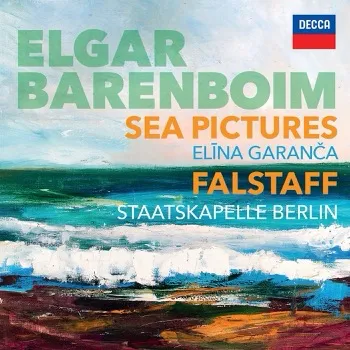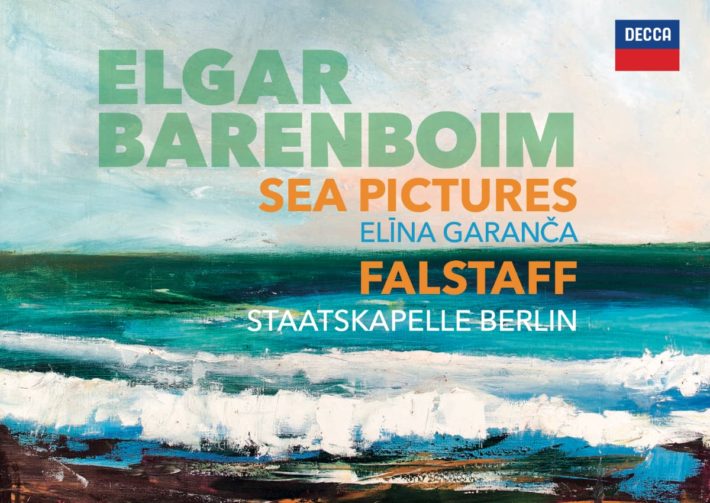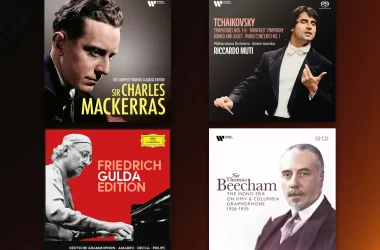This new album by Decca includes two pieces Barenboim has recorded before, as part of his Elgar series with the London Philharmonic Orchestra in the mid to late 1970. In his older, impressive, and often overlooked version of “Sea Pictures” with the LPO, Yvonne Minto sang the Mezzo-Soprano role. In this newer Sea Pictures Barenboim is joined by mezzo-soprano Elīna Garanča, conducting the Staatskapelle Berlin, as in his previous recordings for the current series, which included Symphonies 1 and 2, the Cello Concerto, and “The Dream Of Gerontius”.

Whether from the piano stool or podium, Barenboim is a sympathetic and natural accompanist. As in other recent Concerto releases, including with cellist Kian Soltani (reviewed here), the orchestral playing is carefully controlled, allowing soloist Elīna Garanča to shine. Barenboim refocuses and adjusts the orchestral details from his previous recording with Minton, giving Garanča a slightly different sound. The orchestral phrases are better understood and the articulation is more rounded, with commendable playing from Staatskapelle Berlin.
The five songs are slightly more tentative and measured than Janet Baker’s classic recording with Barbirolli. Garanča brings a muted drama to the cycle, with a reflective ambiance. The first three songs hold such promise, but the most famous of the cycle, “Where Corals Lie”, misses the sense of spontaneity and energy one hears from Minton. Baker, though slower, weaves a storyteller’s yarn throughout with total conviction.
The final song, “The Swimmer”, is overly restrained, preventing the swell in grander moments. Garanča’s diction is precise in the opening three songs, yet she sadly loses the clarity in the fourth and, most noticeably, the final song. Her voice does have a consistently rich contralto tone in the lower register, with smooth mezzo mellowness in the upper. Overall, the distinctiveness of Garanča’s voice and the strong intonation make this a worthy listen; Garanča and Barenboim bring delicate intimacy and a seriousness, despite the momentary shortcomings.
Falstaff — One of Elgar’s finest orchestral pieces, has parallels with Strauss’ tone poems. Barenboim clearly understands this as he expresses the recurring melodic ideas. Barenboim Refines his view of Falstaff compared to his previous 1970s version, finding a different take on his personality. Barenboim’s newer view now depicts the boisterous, comical and flamboyancy of Falstaff less whimsically. Like in Sea Pictures, the full vivaciousness of this Elgarian imagery has acquired a sepia layer, changing the overall color, evoking a more ambiguous and sinister character.
Composed in five sections or scenes, the opening “Falstaff and Prince Henry” is slightly disorientating, capturing something of the essence of Falstaff’s staggering, gigantic persona in grand symphonic style. The second and final sections are particularly commendable. “Revery and Sleep” and “Dream interlude” is atmospheric whilst the closing section too has something touching, familiar, and nostalgic. The overall vision from Barenboim is effective and persuasive in finding the balance between gregariousness and spirit. Comparably, Andrew Davis’ highly personal take with the BBC Symphony Orchestra (1995) is more vivacious.
These live Berlin recordings don’t capture all the orchestral features in the same detail as neither of Barenboim’s previous renditions. The bassoon, cello, and violin solos come across well in Falstaff, but the woodwind in Sea Pictures, especially in the denser passages, lack clear definition. Occasional audience intrusion in Falstaff is noticeable, but doesn’t detract from this insightful and pleasing interpretation.
Elgar – Sea Pictures, Op. 37; Falstaff, Op. 68
Elīna Garanča – Mezzo-Soprano
Staatskapelle Berlin
Daniel Barenboim – Conductor
Decca Classics, CD 4850968




















